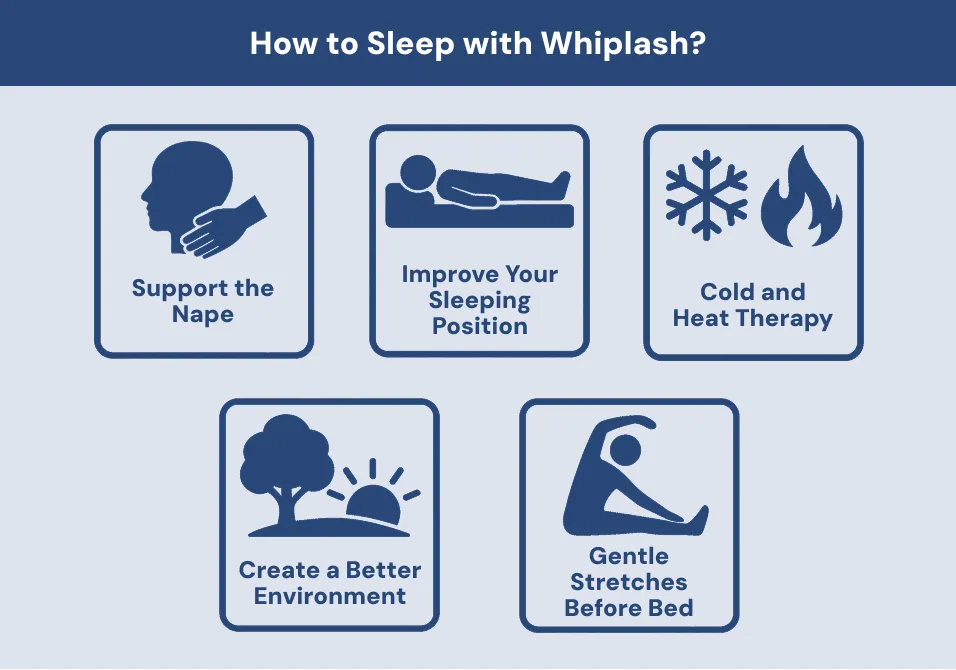If you have ever suffered from a whiplash injury, you know how tough it is to manage the pain. However, what many of us are unaware of, is that it contributes to disturbed sleep. Sleeping with whiplash can disrupt sleep patterns. Continue reading to learn what you can do to have better sleep.
Whiplash and Sleep Problems: What’s the Connection?
This is an injury to the neck that usually occurs when there is a jolting action. An accident cause straining of:
- Muscles
- Tendons
- Ligaments
Afterwards, you develop stiffness, soreness, and pain in the nape and shoulders. But how does it affect your sleep? The results of a clinical trial revealed that patients with neck injury reported significant sleep disturbances. This makes sleeping with whiplash clearly uncomfortable.
According to a study conducted by Ashley Smith and her colleagues,
“Greater sleep disturbance was associated with increased duration of symptoms, higher levels of pain and disability, higher levels of emotional distress and pain catastrophizing, and functional impairment (reduced health-related quality of life).”
Ashley Smith et al.
Night Time Pain
The whiplash pain becomes more uncomfortable when lying down. Your body is at rest, but the muscles of your nape are not. Thus, sleeping with whiplash may be quite uncomfortable because you are unable to find a comfortable position.
Tossing and Turning
Neck injury can be a cause of restlessness, too. Because your nape hurts, you constantly change positions in your sleep to avoid agony. This disturbs your sleep cycle and prevents you from entering deep sleep.
Sleep Disturbances and Fatigue
The chronic neck pain can lead to persistent sleep disorders, including insomnia. Such sleep deprivation may result in daytime fatigue. Further, it reduces functional capacity and interferes with the recovery process.
Get an insight into Chiropractic Care for Whiplash.
How to Sleep with Whiplash?
If not dealt with, this type of injury and disturbed sleep can become a vicious cycle. Pain prevents someone from sleeping, and not sleeping amplifies the pain. Following are some of the tips to guide you on sleeping with whiplash
Support the Nape
Supporting oneself properly when sleeping plays a huge role in attempting to manage whiplash pain at night. This can be done by:
- Choosing the right pillow can make all the difference in keeping the neck in its natural curve.
- It shouldn’t be too high or too low; both will strain the neck muscles.
- Memory-foam pillows are often recommended because they mould to your shape and give uniform support.
Improve Your Sleeping Position
Sleeping on your back is usually the best position to sleep with whiplash. It keeps your spine aligned and puts less stress on your nape. Here’s what works best:

- Sleep on your backpack as it is the best position which keeps the head, neck, and spine aligned naturally.
- If sleeping on your back is hurting you, then you may sleep on your side. This is the second best position to sleep with whiplash.
- Avoid sleeping on your neck as it might twist your neck.
- Do not use high pillows or multiple ones as they may push your neck forward.
If you are a side sleeper, ensure that the level of your head and neck is supported.
Cold and Heat Therapy
Using cold and heat therapy can help reduce pain and make falling asleep easier.
- A warm heating pad or water bottle can be used to help relax muscles and soothe discomfort.
- An ice pack is another option to go for if your neck feels inflamed or swollen.
- Applying heat or cold therapy before bedtime can help ease the pain and facilitate sleeping with whiplash.
Create a Better Environment
The following suggestions may be helpful while sleeping with whiplash:
- Keep the room cool as it contributes to better sleep even during periods of physical discomfort.
- Limit light and noise so that it can close out the distractions that wake you up.
- Go to bed and wake up at the same time every day for your body’s internal rhythm that would help you in falling asleep.
Gentle Stretches Before Bed
Light stretching before bed prevents neck and shoulder tension. Neck rolls and shoulder shrugs relax stiff muscles. This helps alleviate pressure on the strained muscles. Just ensure to move slowly to avoid further aggravating the injury.
Opt For Pain Management Options
For severe pain, temporary relief can be achieved with pain relievers. You can also discuss other pain management options with your doctor. This may include the following:
Medication:
For pain that is more severe, your physician may prescribe muscle relaxants or stronger pain medications to make sleeping with whiplash easy for you.
Exercises:
A physical therapist will take you through a series of exercises to strengthen the muscles. This improves flexibility and helps the process of pain relief.
Learn about how Chronic Pain Rehabilitation works.
Case Study
A UK-based woman who experienced ongoing symptoms following a whiplash injury. She was injured in a car accident and shortly began suffering from persistent neck pain. Over time, this evolved into chronic pain and significant disruption to her daily life including sleep.
Although no formal sleep study was reported, the patient described persistently poor sleep. She was not able to find comfort due to ongoing neck pain, and feeling unrested even after nights in bed.
The physician focused on an integrative care plan. It includes pain management, neck-focused therapies, lifestyle and sleep hygiene interventions. With progressive multi-modal care, focus on sleep and pain improved her quality of life.
Read our thorough guide on Whiplash Injury Claim Process.
Let Concise Medico Help You Get a Good Night Sleep
Sleeping with whiplash can be daunting. But you do not have to let pain take your rest away. All of the suggestions above on how to sleep with whiplash, will help improve both sleep and overall quality of life.
At Concise Medico, we understand how tough it can be to manage both the physical and mental challenges of whiplash. Our rehabilitation services can help put you on track. For any other advice or assistance that you might need, contact us today.
FAQs
If you have ever suffered from a whiplash injury, you know how tough it is to manage the pain. However, what many of us are unaware of, is that it contributes to disturbed sleep. Sleeping with whiplash can disrupt sleep patterns. Continue reading to learn what you can do to have better sleep.
Whiplash and Sleep Problems: What’s the Connection?
This is an injury to the neck that usually occurs when there is a jolting action. An accident cause straining of:
- Muscles
- Tendons
- Ligaments
Afterwards, you develop stiffness, soreness, and pain in the nape and shoulders. But how does it affect your sleep? The results of a clinical trial revealed that patients with neck injury reported significant sleep disturbances. This makes sleeping with whiplash clearly uncomfortable.
According to a study conducted by Ashley Smith and her colleagues,
“Greater sleep disturbance was associated with increased duration of symptoms, higher levels of pain and disability, higher levels of emotional distress and pain catastrophizing, and functional impairment (reduced health-related quality of life).”
Ashley Smith et al.
Night Time Pain
The whiplash pain becomes more uncomfortable when lying down. Your body is at rest, but the muscles of your nape are not. Thus, sleeping with whiplash may be quite uncomfortable because you are unable to find a comfortable position.
Tossing and Turning
Neck injury can be a cause of restlessness, too. Because your nape hurts, you constantly change positions in your sleep to avoid agony. This disturbs your sleep cycle and prevents you from entering deep sleep.
Sleep Disturbances and Fatigue
The chronic neck pain can lead to persistent sleep disorders, including insomnia. Such sleep deprivation may result in daytime fatigue. Further, it reduces functional capacity and interferes with the recovery process.
Get an insight into Chiropractic Care for Whiplash.
How to Sleep with Whiplash?
If not dealt with, this type of injury and disturbed sleep can become a vicious cycle. Pain prevents someone from sleeping, and not sleeping amplifies the pain. Following are some of the tips to guide you on sleeping with whiplash
Support the Nape
Supporting oneself properly when sleeping plays a huge role in attempting to manage whiplash pain at night. This can be done by:
- Choosing the right pillow can make all the difference in keeping the neck in its natural curve.
- It shouldn’t be too high or too low; both will strain the neck muscles.
- Memory-foam pillows are often recommended because they mould to your shape and give uniform support.
Improve Your Sleeping Position
Sleeping on your back is usually the best position to sleep with whiplash. It keeps your spine aligned and puts less stress on your nape. Here’s what works best:

- Sleep on your backpack as it is the best position which keeps the head, neck, and spine aligned naturally.
- If sleeping on your back is hurting you, then you may sleep on your side. This is the second best position to sleep with whiplash.
- Avoid sleeping on your neck as it might twist your neck.
- Do not use high pillows or multiple ones as they may push your neck forward.
If you are a side sleeper, ensure that the level of your head and neck is supported.
Cold and Heat Therapy
Using cold and heat therapy can help reduce pain and make falling asleep easier.
- A warm heating pad or water bottle can be used to help relax muscles and soothe discomfort.
- An ice pack is another option to go for if your neck feels inflamed or swollen.
- Applying heat or cold therapy before bedtime can help ease the pain and facilitate sleeping with whiplash.
Create a Better Environment
The following suggestions may be helpful while sleeping with whiplash:
- Keep the room cool as it contributes to better sleep even during periods of physical discomfort.
- Limit light and noise so that it can close out the distractions that wake you up.
- Go to bed and wake up at the same time every day for your body’s internal rhythm that would help you in falling asleep.
Gentle Stretches Before Bed
Light stretching before bed prevents neck and shoulder tension. Neck rolls and shoulder shrugs relax stiff muscles. This helps alleviate pressure on the strained muscles. Just ensure to move slowly to avoid further aggravating the injury.
Opt For Pain Management Options
For severe pain, temporary relief can be achieved with pain relievers. You can also discuss other pain management options with your doctor. This may include the following:
Medication:
For pain that is more severe, your physician may prescribe muscle relaxants or stronger pain medications to make sleeping with whiplash easy for you.
Exercises:
A physical therapist will take you through a series of exercises to strengthen the muscles. This improves flexibility and helps the process of pain relief.
Learn about how Chronic Pain Rehabilitation works.
Case Study
A UK-based woman who experienced ongoing symptoms following a whiplash injury. She was injured in a car accident and shortly began suffering from persistent neck pain. Over time, this evolved into chronic pain and significant disruption to her daily life including sleep.
Although no formal sleep study was reported, the patient described persistently poor sleep. She was not able to find comfort due to ongoing neck pain, and feeling unrested even after nights in bed.
The physician focused on an integrative care plan. It includes pain management, neck-focused therapies, lifestyle and sleep hygiene interventions. With progressive multi-modal care, focus on sleep and pain improved her quality of life.
Read our thorough guide on Whiplash Injury Claim Process.
Let Concise Medico Help You Get a Good Night Sleep
Sleeping with whiplash can be daunting. But you do not have to let pain take your rest away. All of the suggestions above on how to sleep with whiplash, will help improve both sleep and overall quality of life.
At Concise Medico, we understand how tough it can be to manage both the physical and mental challenges of whiplash. Our rehabilitation services can help put you on track. For any other advice or assistance that you might need, contact us today.




